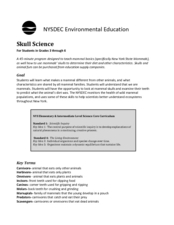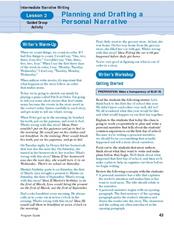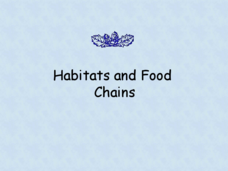Curated OER
Try These Egg-citing Activities to Celebrate Better Breakfast Month!
Have some fun with eggs while learning the health benefits they provide.
Curated OER
Parallel Structure, Exercise 1
Challenge your pupils' writing skills with this two-page worksheet. There are a total of twenty sentences which must be read in order to determine whether or not they contain errors in parallel structure. Note: This worksheet accompanies...
Desert Discoveries
What's For Dinner?
Youngsters compare the teeth of plant-eating dinosaurs with those of meat-eating dinosaurs. The concepts of herbivore vs. carnivore are also introduced. There is an excellent worksheet embedded in the plan which shows five skulls of...
Curated OER
Dinnertime for Animals
Is a deer an herbivore? What about a spider? Experiment with the food chain in an interactive science experiment. After listing the herbivores from a selection of animals, third and fourth graders compare the skulls and teeth of...
Curated OER
Skull Science
What can your class learn from a skull? With proper facilitation, they can learn about diet, physical adaptations, special differences, and even the environment. Pupils will examine a series of mammal skulls and pelts to help them...
Exploratorium
Sound Bite
Learners use their teeth for more than just eating. The activity shows class members how to send sound through their teeth by using an electric motor connected to a radio to generate vibrations. Biting on the motor...
101 Questions
How Many Hot Dogs?
Top off your hot dogs with a little math. Learners view a video on a hot dog eating contest, and then answer questions using estimation. Using a table of hypothetical data, they create algebraic expressions to represent the situation.
Curated OER
Planning and Drafting a Personal Narrative
Bring your learners together to write a class narrative about the first day of school. Start off by teaching them about sequence with a quick oral activity. Then, work together to fill out a story map. Finally, compose the class...
Curated OER
Bug's Eye View
Investigate the life of bugs and how they interact with the environment in this integrated science and language arts lesson. Young scientists construct mini environments in cages in order to make observations. This data forms the basis...
American Museum of Natural History
Fighting Dinos
A famous fossil of fighting dinosaurs holds as many questions as answers. Scholars first analyze the fossil itself by virtually highlighting the specific bones of the dinosaurs and read about their function and importance. They then test...
Curated OER
Vamos a practicar con reflexivos
Give your Spanish language learners an opportunity to practice with reflexives. Ten simple sentences are provided in English, and they must translate them into Spanish.
Perkins School for the Blind
Silly or Sensible?
Is it silly or sensible? That's a great question, and it's the question that will drive this entire lesson. Learners with special needs and visual impairments work together to analyze verbal information. The instructor makes a statement,...
Planet PDF
The Jungle Book
Being raised by wolves has its advantages. An eBook gives readers the chance to experience Rudyard Kipling's classic novel The Jungle Book, a story about a boy named Mowgli who wants to stay with the wolves that raised him instead of...
Curated OER
Planning to Parent, Day 1: Infant Health
What do infants need? What are parental responsibilities? Why breastfeed? What are the pros and cons? When do infants sit-up, roll over, crawl, talk, get teeth, eat solid foods, and sleep through the night? So many questions, and this is...
BBC
Ourselves
Young biologists identify parts of the body, sort humans from other animals, and list the difference they see. Learners are split up into groups of three, and each group must find pictures in magazines of humans and other animals. They...
Curated OER
Habitats and Food Chains
Uncover the world of animal habitats, food chains, and the ecosystems with this well-put-together presentation. Each slide contains information and images that represent various aspects related to the ecosystem. Habitat, animal...
American Museum of Natural History
What Do You Know About the Human Microbiome?
Scholars answer 10 multiple choice questions to test their knowledge about the human body and microbes. Correct answers come with a rewarding tone and brief description.
Cornell University
Vitamin C Module
Test the levels of vitamin C in different juices. After a lesson on the importance of vitamin C in our diets, learners use titration to determine the vitamin C content in juice. They use their experience with the titration to study the...
BBC
Sound and Hearing
First and second graders recognize that sound is generated in a variety of ways, and that it comes from many different sources. They explore tone and volume, realizing that there are different ways to describe sound. Some musical...
Curated OER
Introduce Vocabulary: Giggle, Giggle, Quack (Cronin)
Farmer Brown has his hands full with a tricky duck in Norah Cronin's book Giggle, Giggle, Quack, the context of this vocabulary study. This text is available on YouTube if you can't find it. Before reading, introduce the high level...
American Museum of Natural History
Extreme Mammals
Extreme characteristics can create some unusual mammals. Learners flip through a slide show of some of the most interesting mammals that are both living and extinct. Implement as a remote learning resource or use in-class to review...
Positively Autism
Morning Routine Picture Cards
Mornings can be a challenge. There's so much to remember do in so little time. Foster self-efficacy skills in learners of any ability level or age and reduce stress with these morning routine picture cards.
Curated OER
Mammal Characteristics
In this mammal characteristics, students study diagrams to compare the different types of teeth found in herbivores and carnivores. This worksheet has 1 short answer and 2 multiple choice questions.
Curated OER
Dining Out With Fishes of the Hudson
In this reading comprehension instructional activity, 5th graders read information and complete 3 activities based on the information they have read.























